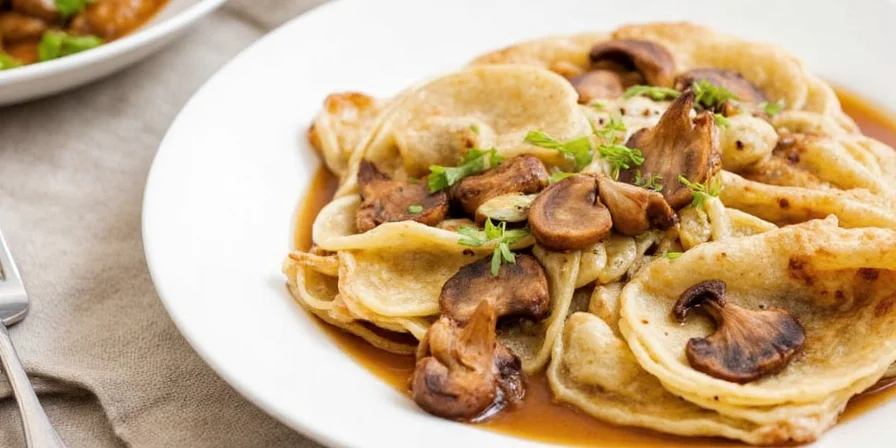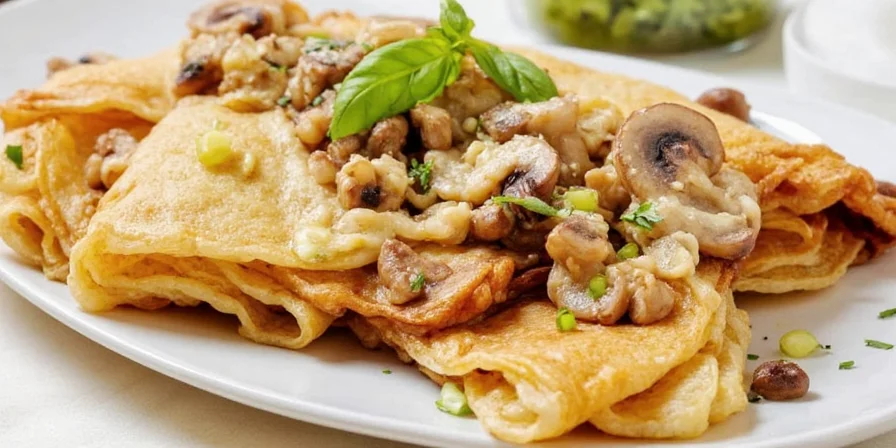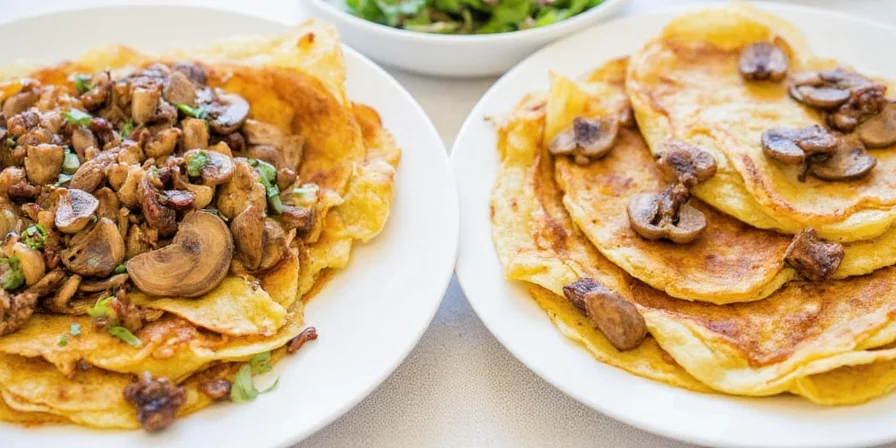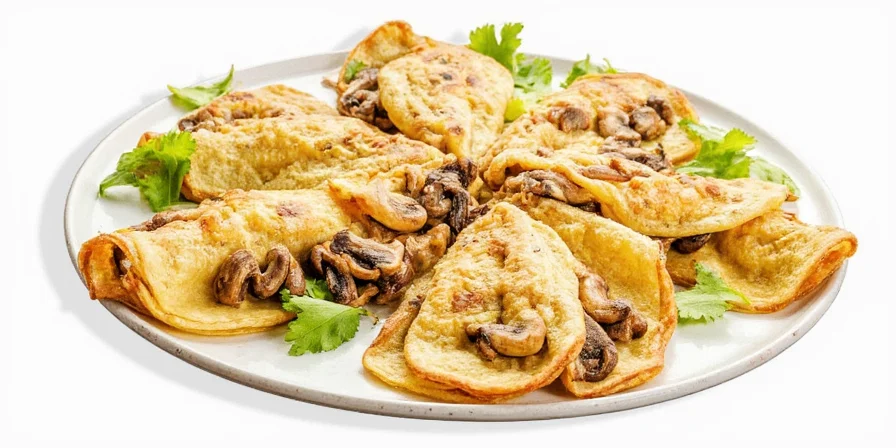For home chefs and culinary experimenters seeking to transform humble mushroom crepes into extraordinary dishes, this guide delivers scientifically validated spice pairings that unlock unprecedented flavor dimensions. We’re diving deep into Innovative Spice Pairings — revealing how strategic combinations elevate earthy fungi from basic comfort food to restaurant-quality masterpieces.
You'll discover not only which spices harmonize with specific mushrooms, but the molecular science behind each pairing. Plus, we’ll integrate sustainability insights showing how these techniques reduce food waste while maximizing flavor impact. Prepare for practical applications that turn your kitchen into a flavor laboratory.
Table of Contents
- Introduction
- Sumac & Porcini: The Zesty Forest Floor
- Sichuan Pepper & Shiitake: The Tingling Umami Storm
- Star Anise & Truffle Oil: Earth Meets Elegance
- Curry Leaves & Oyster Mushrooms: A South Asian Twist
- Cumin & Morel: Desert Heat Meets Woodland Wonder
- Smoked Paprika & Chanterelle: Smoky Sunset on a Crepe
- Coriander & Button Mushrooms: Simple But Sublime
- The Science Behind the Magic
- Pro Tips for Perfect Spiced Mushroom Crepes
- Sustainability Through Flavor Innovation
- Conclusion
- Frequently Asked Questions
Why Mushroom Crepes?
Mushrooms are nature’s umami bombs. From delicate enoki to meaty portobellos, their rich, savory depth makes them a perfect canvas for bold spice experiments. Crepes, with their soft texture and slightly sweet undertones, offer a gentle embrace that lets those flavors shine without fighting for attention.
Sumac & Porcini: The Zesty Forest Floor
Porcini mushrooms have an intense, woodsy flavor that can stand up to bright, tangy spices like sumac. This vibrant red powder, made from dried berries, brings a citrusy pop that cuts through the richness of porcini, creating a flavor reminiscent of a sun-dappled forest after rain.

Sichuan Pepper & Shiitake: The Tingling Umami Storm
Shiitake mushrooms are already packed with umami — now imagine them paired with Sichuan pepper. That mouth-numbing sensation doesn’t just add heat; it heightens every bite. Try lightly toasting the Sichuan peppercorns and grinding them fresh over sautéed shiitakes before stuffing your crepe.
Star Anise & Truffle Oil: Earth Meets Elegance
This combo sounds fancy — and it is! Star anise adds a licorice-like warmth, while truffle oil offers that unmistakable earthiness. Together, they create a luxurious backdrop for any mushroom crepe, especially when using mild button or cremini mushrooms.

Curry Leaves & Oyster Mushrooms: A South Asian Twist
Fragrant curry leaves bring a nutty, earthy aroma that complements the velvety texture of oyster mushrooms perfectly. Temper the leaves in hot oil before adding the mushrooms for a deeply aromatic experience that’s sure to wow.
Cumin & Morel: Desert Heat Meets Woodland Wonder
Cumin may seem more at home in taco fillings, but its smoky warmth works surprisingly well with morels. These sponge-like mushrooms absorb cumin beautifully, creating a flavor profile that’s both exotic and comforting.

Smoked Paprika & Chanterelle: Smoky Sunset on a Crepe
Chanterelles have a fruity, apricot-like note that contrasts delightfully with the campfire kick of smoked paprika. Add a dash during the last minute of cooking to preserve the smokiness and let it mingle with the mushroom’s natural sweetness.

Coriander & Button Mushrooms: Simple But Sublime
Button mushrooms often get overlooked, but ground coriander gives them new life. It enhances their subtle nuttiness and pairs well with a touch of thyme or garlic. Ideal for quick weeknight crepes with minimal fuss.
The Science Behind the Magic
Ever wonder why some spices just *click* with mushrooms? It all comes down to flavor compounds. Mushrooms contain glutamates (hello, umami!), which pair beautifully with spicy, aromatic, or acidic elements.
Here's a precise breakdown:
| Spice | Main Flavor Compound | Complementary Mushroom Type | Flavor Interaction |
|---|---|---|---|
| Sumac | Citric acid, tannins | Porcini | Brightens up the rich, meaty flavor |
| Sichuan Pepper | Hydroxy-alpha-sanshool | Shiitake | Adds tingling heat that enhances umami |
| Star Anise | Anethole | Any mushroom with truffle oil | Enhances earthiness with licorice notes |
| Curry Leaves | Caryophyllene, limonene | Oyster | Deepens aroma and adds herbal complexity |
| Cumin | Cumin aldehyde | Morel | Amplifies natural sweetness and nuttiness |
| Smoked Paprika | Smoke-derived compounds, carotenoids | Chanterelle | Provides smoky contrast to fruit-forward fungi |
| Coriander | Linalool, pinene | Button | Brings out subtle sweetness and nutty tones |
Pro Tips for Perfect Spiced Mushroom Crepes
- Dry before you fry: Mushrooms release water when cooked. Pat them dry before sautéing to avoid soggy crepes.
- Toast your spices: Lightly toasting whole spices before grinding unlocks deeper flavors.
- Layer wisely: Use spices as finishing touches or cook them early — depends on volatility.
- Pick your protein: Add crumbled goat cheese, smoked tofu, or a fried egg for extra depth.
- Go global: Try chermoula, za’atar, garam masala, or berbere for cross-cultural crepe adventures.
Sustainability Through Flavor Innovation
Revolutionary spice pairings aren't just culinary upgrades—they're resource-smart strategies. By transforming affordable, abundant mushrooms like button or oyster varieties through precise spicing, you reduce reliance on premium ingredients. Spices naturally extend dish freshness through antimicrobial properties, cutting food waste while delivering gourmet results from pantry staples. This approach aligns flavor excellence with planetary responsibility.
Conclusion
Spices aren’t just about heat — they’re storytellers, mood setters, and flavor transformers. With these innovative pairings, your mushroom crepe can take on entirely new personalities: zesty, smoky, fiery, floral, and everything in between.
Whether you're hosting a brunch, treating yourself to a lazy Sunday morning, or impressing a date with your culinary prowess, don’t be afraid to experiment. After all, the best recipes come from curiosity — and maybe a little kitchen chaos.
Now go forth, season boldly, and let your taste buds dance.
Frequently Asked Questions
What is the best spice to use with common button mushrooms?
Ground coriander enhances button mushrooms' subtle nuttiness without overpowering. Add a pinch of thyme for a balanced, elegant flavor profile perfect for quick weeknight crepes.
Can I substitute dried mushrooms for fresh in these pairings?
Yes, but rehydrate dried mushrooms (like porcini) in warm water first. Use the strained soaking liquid as a flavor-boosting broth in your crepe filling. Dried mushrooms often have intensified umami, so reduce added salt accordingly.
How do I prevent mushroom crepes from becoming soggy?
Pat mushrooms dry before sautéing and cook them until all liquid evaporates. Let filling cool completely before wrapping crepes. For extra insurance, spread a thin layer of crème fraîche on the crepe before adding filling to create a moisture barrier.
Which spice pairing works best for vegan mushroom crepes?
Sichuan pepper with shiitake creates a complex umami explosion without dairy. The tingling sensation mimics richness typically provided by cheese. Add a splash of tamari during cooking for depth that satisfies vegan palates.
Do these pairings work with foraged wild mushrooms?
Absolutely. Wild morels shine with cumin, while chanterelles pair beautifully with smoked paprika. Always positively identify foraged mushrooms and cook thoroughly. Start with 1/4 the recommended spice amount since wild varieties often have more intense flavors.










 浙公网安备
33010002000092号
浙公网安备
33010002000092号 浙B2-20120091-4
浙B2-20120091-4